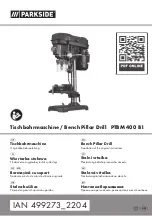
8
leaK TesT
geNeral
All gas connections of the barbecue are tested for leaks in the factory prior
to shipment. Nevertheless, when mounting the device, it must be checked
entirely for gas leaks, because of possible damages during transportation
or due to exposure to extreme pressure. Regularly check the device for
leakage, or check whether you can smell any gas.
beFOre cHecKINg:
• Make sure to remove all packing materials from the barbecue, including
the straps keeping the burnerin its place.
• Do not smoke while checking for leakage.
• Never check for leakage with open fire.
• Prepare a solution of water and soap of one part detergent and one
part water. Use a spray can, brush or cloth to apply the solution to the
connections. Make sure the gas cylinder is full before the first leak test.
• Checking for leaks must be performed outdoors on a well-ventilated
spot, away from ignition sources such as gas or electrical devices and
combustible materials.
• Keep the barbecue away from open fire and/or sparks during the test.
cHecKINg:
• Make sure all control knobs are set to position “OFF”.
• Make sure the pressure regulator is properly connected to the gas
cylinder.
• Completely open the gas tap of the gas cylinder by turning the knob
counter-clockwise. In case you hear a hissing sound, IMMEDIATELY turn
off the gas; this indicates a serious leak in the connection. Contact your
gas supplier or fire department.
• Check each connection of the gas cylinder all the way through to the
taps part (the hose leading to the burner) by spraying or brushing the
soap solution on the connections.
• There is a leak when soap bubbles appear. IMMEDIATELY close the gas
tap of the gas cylinder and carefully check all connections. Open the gas
tap again and perform a new check.
• Always close the gas tap of the gas cylinder after the leak test by turning
the knob clockwise.
• Only use the parts recommended by the manufacturer for this
barbeque. The warranty will become void when using other parts. Do
not use the barbeque until all connections are inspected and you are
certain these show no signs of leakage.
saFeTY TIPs:
• Always check for leakage every time you replace the gas cylinder.
• Always check all connections for leakage before each use.
• Use long barbecue tools to prevent burns.
• In case grease or hot objects drop from the barbecue on the gas
tap, pressure regulator, hose or any other part that contains gas,
immediately shut off the gas supply.
• Do not remove the drip tray before the barbecue has not sufficiently
cooled down.
• Close all control knobs and the gas tap of the gas cylinder when not
using the barbecue
• Push the barbecue forward when moving, never pull it.
• A disconnected gas cylinder being stored or moved must be equipped
with a protective cover. Do not store a gas cylinder in confined spaces
such as a carport, covered patio, veranda, garage or other structures.
• Never leave a gas cylinder behind in a vehicle or boat that can get
overheated by the sun.
• Do not store the gas cylinder in or near a place where children play.









































